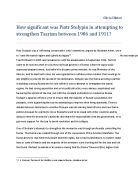How important was Stolypin’s role in the effort to preserve Tsarism?
Stolypin was appointed to be Prime Minister in July 1906. This was in a time of turmoil following the 1905 revolution. Although Nicholas II had retained his position, he had been forced to make important concessions and many people were now feeling disillusioned with their Tsar after the events of Bloody Sunday. Stolypin introduced a number of revolutionary reforms to try to stabilise the empire. He was a conservative and his aim was to preserve Tsarism through his reforms. There has been extensive debate about the importance of Stolypin’s reforms. Some historians believe his actions played an important role in the effort to preserve Tsarism. However, some believe this to be an inaccurate assessment because Stolypin was assassinated in 1911 and his reforms had insufficient time to take effect.
Stolypin introduced many reforms, the most important of which was land reform. He intended to try to solve the peasant question as peasants made up most of the population and their numbers were growing rapidly. He also wanted to “de-revolutionise” them following the events of 1905. He intended to make a new class of richer peasants which would be referred to as the ‘Kulaks’. They would be able to leave the ‘mir’ and build up their own independent consolidated farms. Stolypin believed that these peasants would provide stable support for the imperial government and so diminish support for radical revolutionaries. Stolypin also declared an end to the redistribution of land as the population grew. This meant that all the land the hereditary property of the head of the family. The peasants therefore might now have more incentive to improve their land and consequently increase their yield of crops. Stolypin also made all State and Crown lands available to the Peasants Land Bank for purchase by peasants. Together these reforms made the peasants feel less threatened and therefore had the effect of “de-revolutionising” them. These reforms therefore achieved some success and so would have gained more support for the Tsarist regime.







